Richard Henry Pratt informs the Office of Indian Affairs that he has on hand a larger number of boy's sizes of hose than he can use. As a result he requests he be provided with 20 dozen of boy's size 8 and 140 dozen of men's size 9, 10, and 11. In addition, he requests his estimate for coffee be reduced to 2,500 pounds and no tea.
National Archives and Records Administration
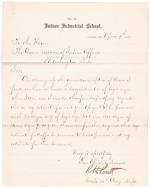
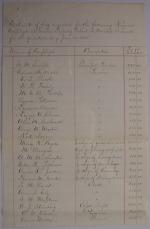
Estimate of funds for the second quarter of 1885 amounting to $8,491.87 for support of the school, $6,090.00 of which is for regular employee pay.
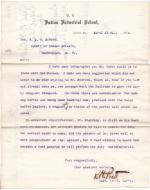
Richard Henry Pratt follows up his telegraph agreeing to send Dr. Obadiah G. Given with the party of Nez Perces being transferred. Pratt also recommends booking the Emigrant Sleepers as they provide the ability to make coffee therefore saving money on the coffee bill.
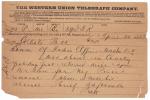
Pratt writes that he is willing to spare the Carlisle School physician Obadiah G. Given for the Nez Perce removal. Pratt asks that his absence be as brief as possible.
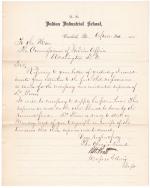
Richard Henry Pratt inquires about expenses related to Obadiah G. Given accompanying the Nez Perce party being transferred. Pratt notes that Given is ready to start when the Bureau of Indian Affairs telegraphs that the expenses will be covered.
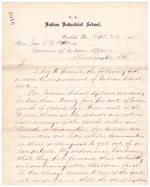
Richard Henry Pratt provides recommendations for improving the Indian School system to the Commissioner of Indian Affairs. Pratt's suggestions include educating everyone of school age compared to the quarter currently enrolled, requiring a census of school age children, and muster of students to track progress.
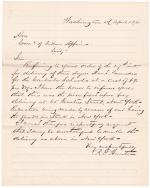
R. F. Hunter writes the Bureau of Indian Affairs regarding the order of three dozen fire prevention hand grenades at a cost of $9 per dozen.
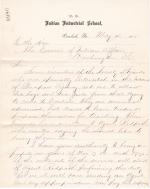
Richard Henry Pratt requests authority to bring in six boys and six girls from the Quapaw Nation to the Carlisle Indian School to learn trades and become teachers. Pratt indicates that the Society of Friends has taken a particular interest in the case of the twelve students and the agent at the Quapaw Agency supports sending the students.
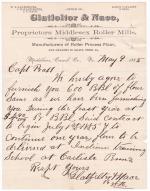
Richard Henry Pratt forwards a contract between the Carlisle Indian School and Glatfelter and Nace for the latter to provide 600 barrels of flour for the 1885 fiscal year.
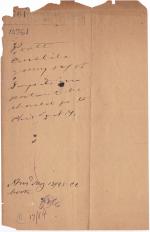
Richard Henry Pratt informs the Office of Indian Affairs that he needs to go to Philadelphia, Pennsylvania and New York. Asks if the Commissioner can visit the following week.
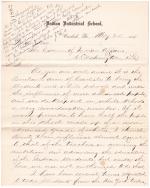
Richard Henry Pratt notes that he believes placing Carlisle Indian School students into white schools is a great benefit for the student. He notes that if it was possible he would like to have half the students at the school made up of white students to exert influence, but notes that this is not possible.. Along these lines he notes that he…
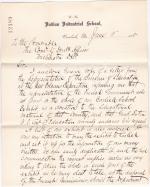
Lyndon A. Smith requests from Richard Henry Pratt part of the Carlisle Indian School Exhibit at the Government Exhibition in New Orleans due to a request by the French Government. Pratt informs the Bureau of Indian Affairs that while he was planning on setting up the exhibit at Carlisle for visitors but that nothing in exhibit cannot be…
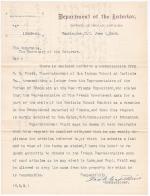
John D. C. Atkins, Commissioner of Indian Affairs, refers to the letter from Richard Henry Pratt regarding donating parts or the whole of the Carlisle Indian School exhibit at the Government Exhibition in New Orleans to the French Government in a letter to the Secretary of the Interior.
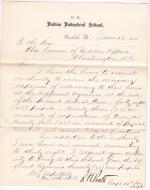
Richard Henry Pratt requests permission to return 48 students of the Carlisle Indian School. Pratt notes that of those being returned 23 students are being sent home due to the expiration of their terms and 25 for various reasons. In addition, he requests permission to bring to Carlisle 70 students.
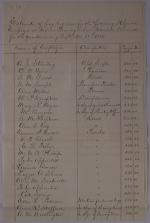
Estimate of funds for the third quarter of 1885 amounting to $24,592.50 for support of the school. Richard H. Pratt also requests additional funds amounting to $6,510.00 for regular employee pay.
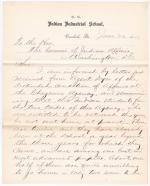
Richard Henry Pratt seeks guidance from the Bureau of Indian Affairs regarding whether or not to return 12 members of the Cheyenne Nation to their home. Pratt references the Cheyenne Agent has written about unfavorable conditions at the Agency and that he believes it unwise to return the students at the time despite all of them having already…
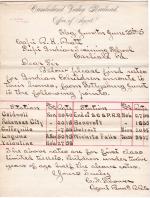
Richard Henry Pratt responds to a letter from the Bureau of Indian Affairs informing him that the Bureau will arrange the agreements in transporting students to and from the Carlisle Indian School. Pratt notes that he has already sought bids from the Baltimore and Ohio and Pennsylvania Railroads for transporting between 40 to 75 students from…
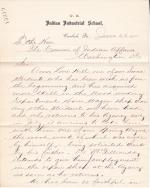
Richard Henry Pratt requests to allow Amos Lone Hill, who is to return home shortly, to purchase a spring wagon he made himself at a discount along with a commendation from the Office of Indian Affairs as an incentive.
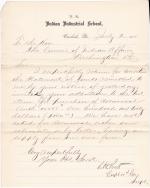
Richard Henry Pratt returns statement of funds for the third quarter of 1885 and advises commissioner he did not request cornmeal. An explanatory cover letter is attached.
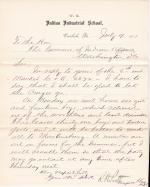
Richard Henry Pratt references a letter from the Bureau of Indian Affairs regarding the Osage students at the Carlisle Indian School. Pratt notes that he has already returned 13 students and can transfer the remaining 43 students to Martinsburg.
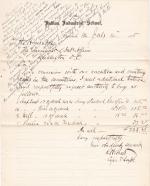
Richard Henry Pratt requests authority to purchase additional tents for the Carlisle Indian School vacation and sanitary camp in the mountains.
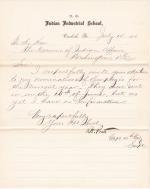
Richard Henry Pratt calls attention to his nomination of employees for the current year sent out on June 15, 1885 which has not yet been confirmed.
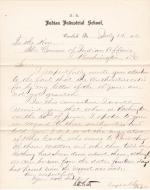
Richard Henry Pratt calls attention to pending requests for authorities requested on June 13, 1885.

Richard Henry Pratt notes that he has received telegram providing authority to return students. He notes that the students were sent on July 6, 1885 and are now home. Pratt further notes that he has already asked for rate for incoming students.
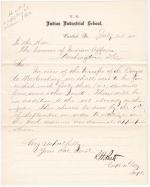
Richard Henry Pratt requests an additional 43 students to make up for the transfer of the Osage students to Martinsburg. He notes this is in addition to the 108 students that have already been authorized.
